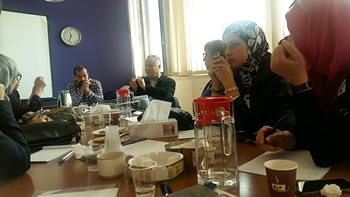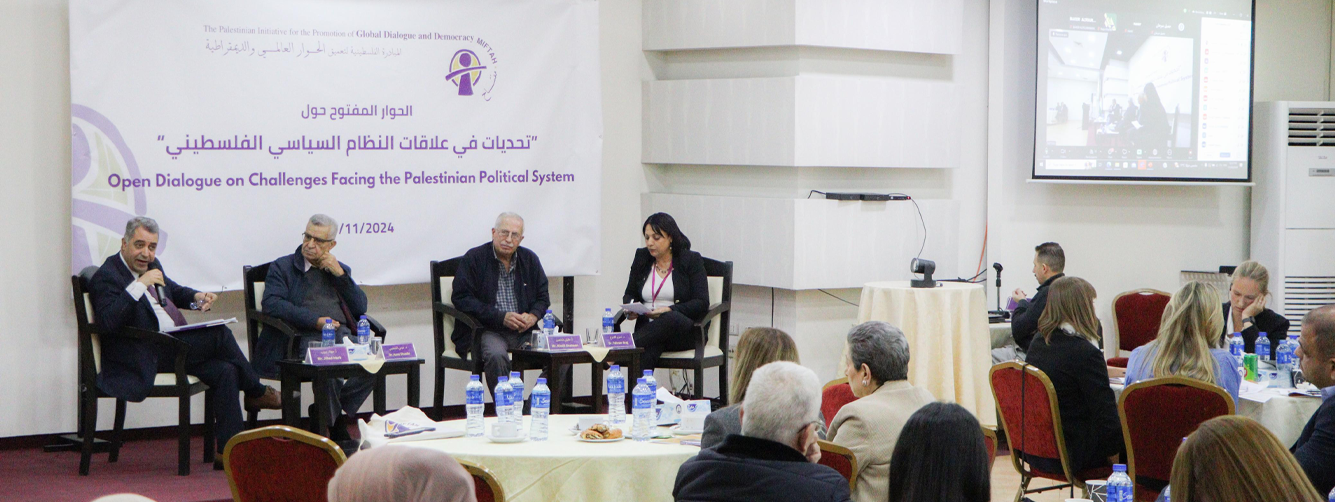
As part of the OXFAM-funded project, “Conflict and Fragility” implemented in the West Bank and Gaza Strip, MIFTAH held two sessions in which the first draft of the study “The impact of the division on Palestinian women” was presented. The study is based on interviews of women who have been affected by the political division between Fatah and Hamas. The study offers an in-depth analysis of the impact of the division on Palestinian women from the social, economic, political and security aspects and identifies the strategies and mechanisms women have taken to confront these challenges in terms of providing protection and a safe environment for themselves and their family.
The sessions were attended by members of the women’s shadow committee for ending the division, a body MIFTAH helped form in order to work in parallel with the official national reconciliation committees. The study’s conclusions were showcased in the sessions, which was followed by discussions among the participants who reflected on the report’s findings. The report itself is considered the first of its kind in terms of data and cases that reflect the reality of Palestinian women vis-à-vis the division.
Presentations
The presentations illustrated the negative impacts the division has had on women and how it caused social collapses which adversely affected Palestinian social fabric as a whole.
One presentation pointed to the different experiences of women in the West Bank and Gaza Strip and how these experiences reflected on the national resistance program of Palestinian women at all levels. It maintained that this called for a consideration of the details in these women’s stories in order to move forward with the national and resistance program.
Transitional justice and impacts of the conflict Another presentation broached the topic of transitional justice, stressing on its importance in preserving the social fabric, which is currently being undermined in both the Gaza Strip and West Bank Furthermore, the presentations discussed the effects of Israel’s aggression on the Gaza Strip, which has left a huge impact on women. Gazan women have found themselves increasingly exposed because of the division, the lag in the reconstruction process and rise in poverty rates. These are all factors that have also increased responsibilities on women and have led to major repercussions at the social level.
Furthermore, the participants warned of a setback in the role of factions and political parties because of the division in terms of national reconciliation.
Ending the division
The AWRAD Center, which lead the data collection and data analysis of the study , indicated part of its significance is because the division has been ongoing for 10 years without resolution. The report included several details on the living conditions of women in the Gaza Strip, their part in the division and the affects it has had on them including the damages it has caused. It noted that addressing the impacts of the division requires a clear mechanism for ending it and its destructive repercussions. In addition, there is a need for more concerted efforts from all institutions and parties to put pressure towards achieving this goal. In order to achieve this, the study maintained that all parties must have a sincere desire to end the political division.
Outstanding results
Member of the women’s shadow committee Suzan Jarrar said that the study and its results showed us a reality different than what we believed or refused to see. “Our focus has only been on the geographic distance,” she admitted. “However, the study showed us how to have a more active role, by putting more pressure and making more efforts with institutions and the national reconciliation committees.“ Jarrar continued: “There are many major challenges whether in the Gaza Strip or here in the West Bank, but we must face and overcome them. We cannot accept a reality in which we say that we are one people in one homeland all while we are separated socially and at so many other levels.”
New rhetoric
MIFTAH’s coordinator in the Gaza Strip Shadia Al Ghoul said this significant study armed the women’s shadow committee with strong rhetoric when speaking about the reconciliation and ending the political division and also in facing off with anyone who claims that the suffering in Gaza is general. “The study confirmed that the suffering is concentrated and specific and that it has more of a direct and indirect impact on women in particular; they are the most affected psychologically, socially and economically,” she said.
New ways of communication
According to Al Ghoul, the committee showed particular interest in the study’s conclusions, recommending their widespread dissemination through new means other than workshops. In particular she pointed to the use of social media websites such as Facebook in order to reach the largest possible number of citizens and decision-makers.
The committee also recommended that an appendix to the study be issued that includes the latest developments such as the recent cut in government salaries and its psychological, social and economic impact on women in particular. Some noted the “mass killings” which took place at the peak of the infighting and which is one of the violations not monitored in the past.
MIFTAH’s Projects’ manager Najwa Yaghi pointed out that the organization’s strategy is focused on developing the “Women Peace and Security” agenda based on data that reflects the situation of Palestinian women affected by the changes and developments in the Palestinian political arena and by Israel’s ongoing measures. “MIFTAH is always unique in terms of new developments, such as this study on Palestinian women, Gazan women in particular,” Yaghi said. “This study will be a database for women’s institutions and the women’s shadow committee. It will empower the committee to be part of the national dialogue on reconciliation, and promote the role of women as monitors over the national reconciliation committees. “
According to the study, the division has led to physical and verbal violence from husbands, which has resulted in divorce in cases where the violence became intolerable or led to the severe injury of the wife. Of course, such cases negatively reflected on the psychological state of the children, family and tribe as a whole.
Moreover, it says the political division resulted in more pressure on Palestinian women; there was an unprecedented rise in the rate of violence against them from family members which also resulted in a rising number of so-called “honor killings.” Fear, anxiety and the lack of a sense of safety all manifestoed into the violence to which women and their families are being subjected.








